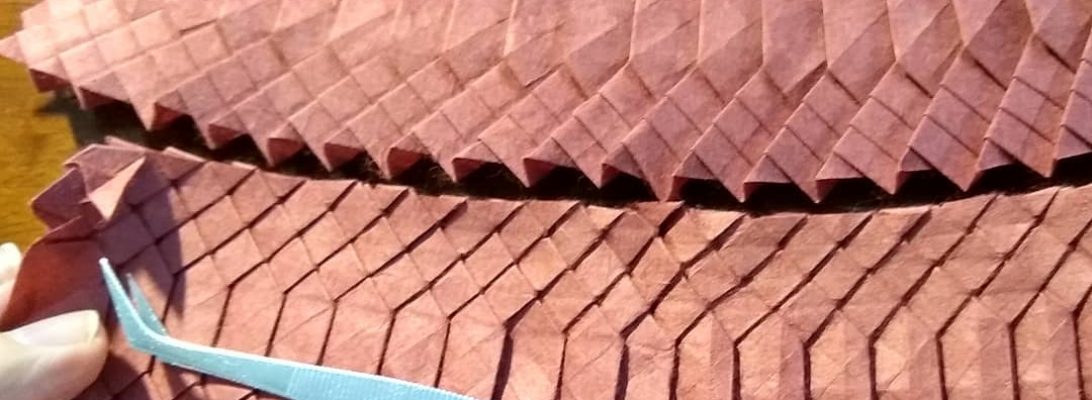I try to mark the passing of Hiroshima Day August 6 with respect and effort.
Having folded the traditional 1000 cranes twice in my life (oddly, the second time my cranes were “borrowed” by a then campaigning year 11 for a community project where he received the credit and was subsequently elected School Captain … but I digress) so thought it time to try something new.
Followers of this blog will have noticed I have been experimenting with the folding of multiple cranes on a single sheet, with some small cuts to liberate corners, making the folding actually possible. This is not an original origami idea, but based on those presented in the oldest origami book in print: Hiden Senbazuru Orikata
Naturally my mind turned to impossible scaling up, reasoning of 2, 4, 8 were possible from a single sheet – why not more. Lots more.
I have some packs of Daiso large format origami paper (50cm squareish) – thank you Ms Kirsten for my first fix, and I had a method for folding fifths, so did, then halved those folds to get tenths, meaning I had 10×10 squares = 100 cranes from one sheet.
So I started doing the pre-creasing on Hiroshima day, near the end (well, more correctly 11:45pm) I began the cutting then realised the enormity of the challenge.
Each square ended up being 5cm, joined to other squares via diagonally opposite connections which I decided would be wing-joins. We can go many ways (as I have discovered) – wing-wing, beak-beak, beak-tail, tail-wing but the combo that sort of behaves most tifily is wing-wing, so set about finding a cutting pattern that would allow me to do that in an organised way, ensuring every square is adjoined to others by opposite corners only.
Thankfully I had learned from previous multi-cranes-from-a-single-sheet experiments that pre-creasing the whole birdbase BEFORE cutting reduced stress on the joins and made the folding possible, I did that.
After cutting, it became a delicate materials handling exercise – the joins were most fragile in partly folded form, pulling the sheet into a twisted, tense mess.
As the folding progressed and finished cranes emerged the joints became more structurally stable and the whole mesh of Tsuru self-organised in a fashion. I rested it on another sheet of the same size, contrasting colour (interestingly I chose the 2 most EVIL colours that exist – lime and magenta) so I could appreciate the scale-diminishing factor as the cranes formed. After finishing a significant portion I then had to decide on orientation of the heads, and decided on 4-crane conversations alternating – this matched the cut pattern and tiled perfectly- a little boring but there was already a lot going on.
The result – nearly 2 weeks late, fatigued and strangely beautiful we have a tsuru matrix unlike anything else I have seen. What this means is it IS possible to fold all 1000 cranes from a single, HUGE sheet of paper but I am NOT interested in doing it without significant sponsorship, supply of stimulants and a source of better paper.


So… I don’t usually post comments but your idea impressed me greatly! It would be a shame to leave this post without a single comment 😀
I tried a 16-crane version from a A4 square and it was quite entertaining. So now I will aim to achieve something as close to your 100 cranes as possible!
I am thinking of using a gold tissue-foil-like paper and then gluing the structure into a shadowbox for display. There is a Japanese culture festival in my university and I think it would make a wonderful piece for the origami booth.
Best regards!
My advice would be to pre-crease BEFORE you cut as the stress on common meridians is the greatest threat. Good luck, I would be interested in the result, link me if possible